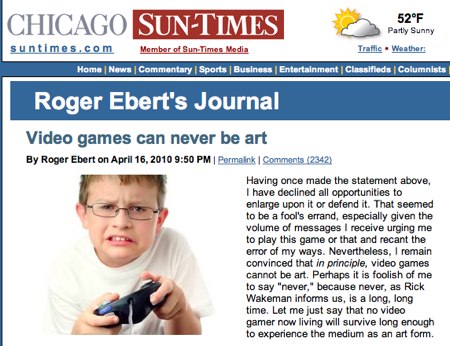Can Games be Art?
Stacey Mason

Roger Ebert’s essay, Video Games Can Never Be Art, has become a hot topic in gaming circles. I respect Mr. Ebert’s opinion, but I have to disagree.
Are games art today? That’s debatable. Most are not. But there are some edge cases, and those are the ones in which we’re interested.
The games Santiago cited were not the best examples, and Ebert is correct that her definition of art is weak. It seems nearly impossible to slap an objective, all-encompassing definition on art, because (as Ebert discusses) art is personal. Art can be beautiful or grotesque, but is above all emotional. It stirs something within us. It explores the essence of what makes us human, and so it affects each person differently.
Ebert argues that games cannot be art because the object of a game is to win. There has been a shift in video games in recent years to view “winning” at a video game as an ending to a story more than actual victory. Now that I think about it, the term “beating a game” has almost completely left my vocabulary in favor of “finishing a game.” Movies, plays, books, and songs all end. The “victory” in a game has become the conventional ending that signals the close of a narrative.
But it’s not the narrative alone that makes a game art. Nor is it the music, the visual art, the expertly-crafted AI, or the multiplicity of endings. It’s the way games emotionally affect the player, and by their nature, this is not something that can be predicted or observed from the outside, any more than we can judge a novel by looking at paintings of its crucial scene. To know a game, you have to play it.
Playing a game, manipulating it and experiencing it as the game responds to your inputs is the key to understanding. The truly moving experience comes from how the games make us feel, which is something that only the playe can experience. The famous airport scene in Modern Warfare 2 or the cafeteria scene in Super Columbine Massacre are excellent examples of how playing a game changes the meaning of a scene; without the controller in your hand, you wouldn’t feel the same hesitatation, guilt and powerlessness. Without playing a game, we cannot understand it.
Ebert is right, however, when he says that measuring a game’s artistic success by its commercial success is foolish. The point that Santiago makes, that the game culture is “growing up” and expecting more from games, is surely true. Video games are still very young, and video games that aspire to some artistic significance have only been around for a few years.
Mark Bernstein notes that games haven’t yet touched on some of the basics of human existence, like sexuality or age. I say give them time. Video games are still very fearful of what audiences might consider indecent, and they have only been around for a short time.
So can video games be art? Whole-heartedly, yes. Are there games now that qualify as such? They’re certainly getting there.
